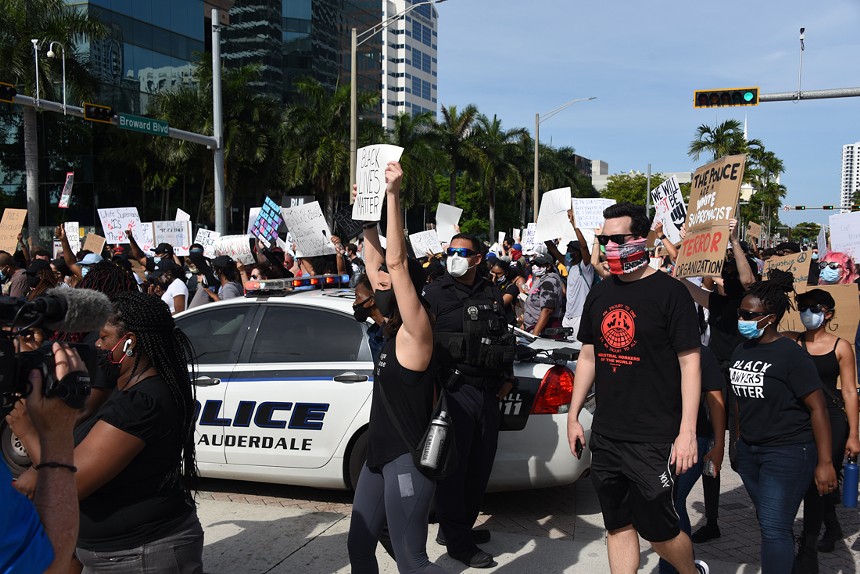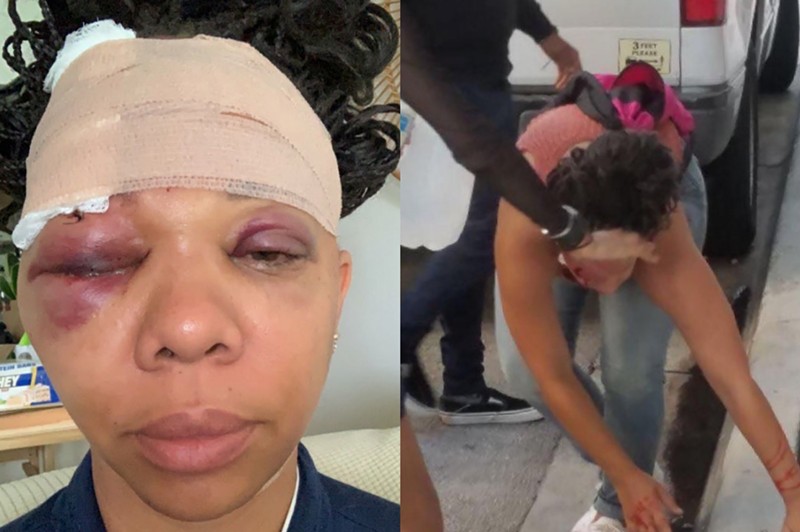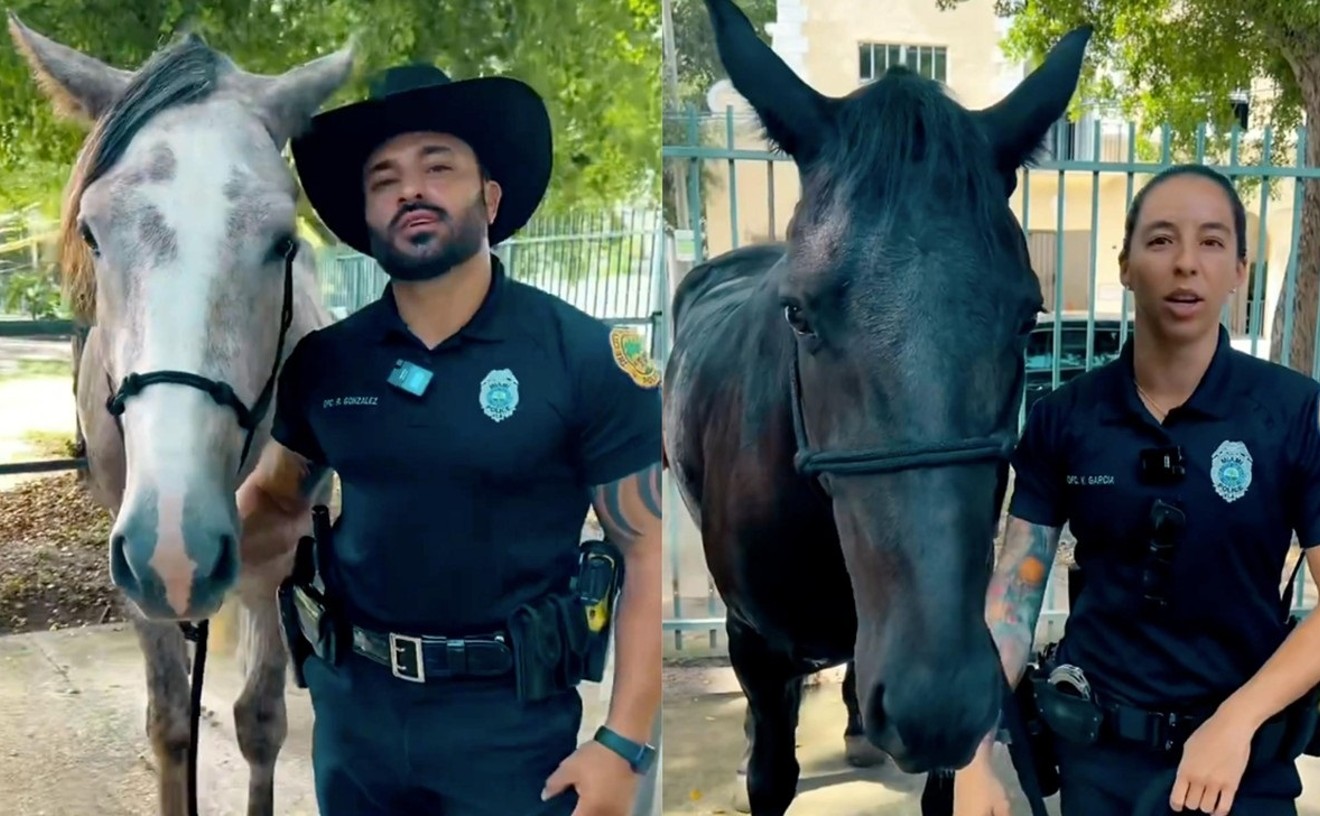In a ruling in a civil rights lawsuit Ratlieff filed last year, U.S. District Judge Rodolfo Ruiz rejected Fort Lauderdale police officer Eliezer Ramos's argument that he was shielded from liability because he was following his supervisors' orders to fire plastic, tear-gas-releasing bullets at a crowd.
Ratlieff suffered a large gash, vision loss, severe damage to her eye socket, and disfiguring swelling when she was shot during the May 2020 protest in downtown Fort Lauderdale, days after the murder of George Floyd in Minneapolis.
In addition to Ramos, Ratlieff's suit names the officer's supervisors and the City of Fort Lauderdale as defendants.
Ruiz's ruling cites a 2004 case in which a federal appeals court wrote that "since World War II, the 'just following orders' defense has not occupied a respected position in our jurisprudence."
The judge denied Ramos' motion to dismiss several claims against him, allowing Ratlieff's lawsuit to move forward on counts of free speech violations, battery, and negligence.
"Ramos argues that because he was following his superiors’ directives to disperse the crowd, Ratlieff has not demonstrated Ramos was subjectively motivated to quell her speech. But Ratlieff has identified a series of events from which a retaliatory motive may be inferred," Ruiz ruled.
The judge refused a request from Ramos and his superiors to invoke "qualified immunity," a legal principle that protects police from civil claims regarding actions performed in the line of duty. In order to overcome the hurdle of qualified immunity, a plaintiff must show that an officer violated a "clearly established" constitutional right.
Ruiz ruled that Ratlieff met that threshold by showing she was peacefully protesting, lawfully exercising her First Amendment rights, and not part of the crowd that was throwing plastic bottles, rocks, and other projectiles at police.
"Ratlieff has sufficiently established, at this stage of the litigation, that [the defendants] violated her clearly established First Amendment rights and are accordingly not entitled to qualified immunity," the judge wrote, noting that the court defers to a plaintiff's factual account when weighing a motion to dismiss.
In allowing the battery claim against the supervising officers to move toward trial, the judge pointed to the allegation that they violated Florida law and their department's internal policy by failing to give a formal order to the crowd to disperse before firing off plastic bullets and tear gas near Ratlieff.
The May 31, 2020, confrontation was part of a wave of nationwide protests over the murder of George Floyd under the knee of Minneapolis police officer Derek Chauvin, who was subsequently convicted of murder and sentenced to more than 22 years in prison. The lawsuit alleges that Ratlieff, a grant-writing consultant for a nonprofit and a great-niece of civil rights activist Fannie Lou Hamer, participated in the demonstration and held a sign saying, "Stop killing us!"
While passing a downtown parking garage where police had begun deploying tear gas, Ratlieff "joined with peaceful participants who were taking a knee and peacefully exercising their First Amendment rights in the presence of the FLPD officers," according to the lawsuit.
Just after 7 p.m., while Ratlieff was attempting to flee from the teargas, she was hit in the face with a "kinetic impact projectile" — a 40mm round consisting of a plastic body, a crushable foam nose, and a payload that releases a two-foot-wide cloud of tear gas. Ratlieff collapsed to the ground, bleeding profusely. A stranger took her to the hospital, where she was treated for severe facial injuries that required multiple stitches and left her face so swollen she was barely recognizable.
Earlier that evening, one officer claimed someone jumped on her patrol car and that she felt she was surrounded and in danger. The police summoned backup as tensions mounted between officers and the crowd. Subsequently, another officer, Steve Pohorence, shoved a kneeling protester to the ground, prompting members of the crowd to begin throwing water bottles at police.

Protesters massed in Fort Lauderdale in May 2020, a week after the murder of George Floyd in Minneapolis.
Photo by Michele Eve Sandberg
Police sought to justify the use of tear gas and kinetic impact projectiles by pointing to members of the crowd who allegedly threw rocks and fireworks at officers.
Ratlieff's lawsuit alleges that Ramos "was not defending life or property" when he shot the round. "He did not fire in response to any reasonable fear of imminent bodily harm to himself or others," the complaint claims.
"FLPD [Fort Lauderdale Police Department] ignored Florida law and FLPD Policy No. 501.10’s dispersal order requirements, even though FLPD had ready access to a pre-recorded dispersal order for broadcasting to the persons gathered in the vicinity," the lawsuit claims.
Fort Lauderdale Police Chief Rick Maglione was later removed from his post amid controversy over his handling of Black Lives Matter protests.
In February 2021, then-interim police chief Patrick Lynn said Ramos was cleared in an internal investigation that concluded "it was not detective Ramos' intent to strike Ms. Ratlieff." According to Lynn, Ramos was aiming for a man who'd "hurled a projectile" at officers.
In his ruling, Judge Ruiz granted the defendants' requests to dismiss counts for alleged violations of due process and Ratlieff's Fourth Amendment rights. He also dismissed a claim for free speech violations on the part of the city. (The judge allowed Ratlieff to amend the lawsuit if she seeks to reassert those claims.)
The court found that the incident did not amount to a "seizure" that could be construed as a Fourth Amendment violation.
A jury trial in the case has tentatively been set for January 2024.














